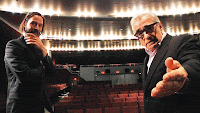Directed by: Christopher Kenneally
Keanu Reeves hosts this look at the digital video revolution.
 Director Kenneally uses Reeves as a mouthpiece to speak with film-makers and hear their thoughts on the current transition from traditional film stock to its digital counterpart. Interviewed are those from across the film-making spectrum; directors, cinematographers, editors, producers and colorists. Some, particularly Christopher Nolan and his cinematographer Wally Pfister, champion film, while others, like James Cameron, Steven Soderbergh and George Lucas, are fully behind digital. Sitting somewhere in the middle are the likes of Martin Scorsese, David Lynch and David Fincher, who acknowledge the pros and cons of each format.
Director Kenneally uses Reeves as a mouthpiece to speak with film-makers and hear their thoughts on the current transition from traditional film stock to its digital counterpart. Interviewed are those from across the film-making spectrum; directors, cinematographers, editors, producers and colorists. Some, particularly Christopher Nolan and his cinematographer Wally Pfister, champion film, while others, like James Cameron, Steven Soderbergh and George Lucas, are fully behind digital. Sitting somewhere in the middle are the likes of Martin Scorsese, David Lynch and David Fincher, who acknowledge the pros and cons of each format. Reeves is an affable host and uses his experience of spending time on film sets to go toe to toe with film-makers when the talk gets particularly techy, as it frequently does. While it's great for film fans to hear the opinions of so many film-makers, too much time is spent on talking heads. We never get to see a visual comparison of the same footage shot on the two formats so, in this way, the film never lives up to its title. Mention of the primary reason for digital's predominance, finance, is also conspicuous by its absence. The most interesting revelation is how arrogant and egotistical the proponents of digital come across. Their motivation seems to be fueled by a lack of trust in their cinematographers and a "control freak" mentality. Soderbergh, Cameron and Lucas live up to their prickly reputations here, coming off as particularly disrespectful to their collaborators.
Reeves is an affable host and uses his experience of spending time on film sets to go toe to toe with film-makers when the talk gets particularly techy, as it frequently does. While it's great for film fans to hear the opinions of so many film-makers, too much time is spent on talking heads. We never get to see a visual comparison of the same footage shot on the two formats so, in this way, the film never lives up to its title. Mention of the primary reason for digital's predominance, finance, is also conspicuous by its absence. The most interesting revelation is how arrogant and egotistical the proponents of digital come across. Their motivation seems to be fueled by a lack of trust in their cinematographers and a "control freak" mentality. Soderbergh, Cameron and Lucas live up to their prickly reputations here, coming off as particularly disrespectful to their collaborators. The elephant in the room of this documentary is digital projection. While we are treated to endless talk of digital film-making, there's no mention of the impact it's had on theatrical exhibition. Digital has finally got to the point where it can compete with film creatively. Some of the best looking films of last year where shot using the new format. The problem arises with screening it in a cinema. In thirty-something years of cinema-going, I've only experienced film break down once, during a screening of 'Amelie'. In the past two months alone, I've been turned away from three screenings due to hard drive and server crashes. Another huge problem is that cinemas have made their projectionists redundant, often leaving the running of multiple screens in the hands of a "technician" who knows little about how films should be displayed. It's rare to find a film being projected correctly now; usually it's in the wrong aspect ratio, the image is out of focus, the top, bottom or sides are cropped; I've even seen films projected upside down. By the time word of a problem gets back to this one person, you've already missed a considerable portion of the movie. Digital may be great for film-makers but certainly not for audiences. Not addressing this issue is a huge oversight of 'Side by Side'.
The elephant in the room of this documentary is digital projection. While we are treated to endless talk of digital film-making, there's no mention of the impact it's had on theatrical exhibition. Digital has finally got to the point where it can compete with film creatively. Some of the best looking films of last year where shot using the new format. The problem arises with screening it in a cinema. In thirty-something years of cinema-going, I've only experienced film break down once, during a screening of 'Amelie'. In the past two months alone, I've been turned away from three screenings due to hard drive and server crashes. Another huge problem is that cinemas have made their projectionists redundant, often leaving the running of multiple screens in the hands of a "technician" who knows little about how films should be displayed. It's rare to find a film being projected correctly now; usually it's in the wrong aspect ratio, the image is out of focus, the top, bottom or sides are cropped; I've even seen films projected upside down. By the time word of a problem gets back to this one person, you've already missed a considerable portion of the movie. Digital may be great for film-makers but certainly not for audiences. Not addressing this issue is a huge oversight of 'Side by Side'.
